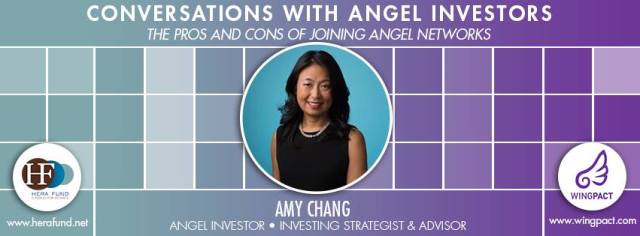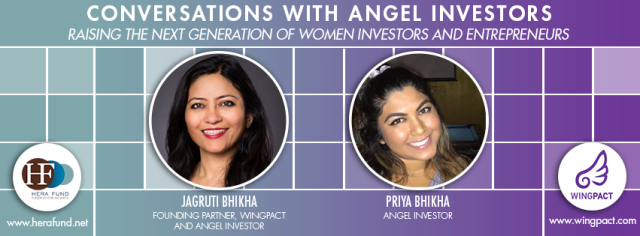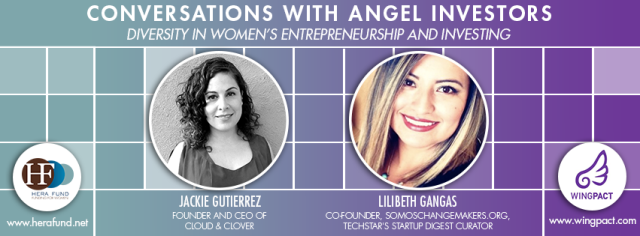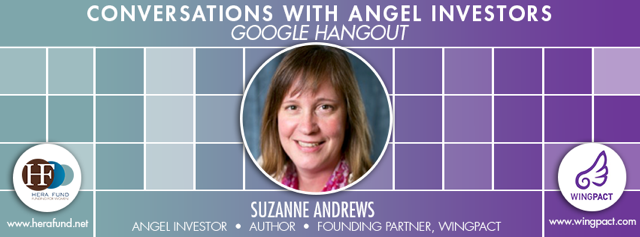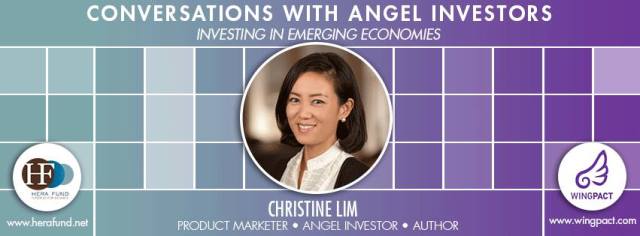
On August 25, 2016, we held our sixth Hera Fund Wingpact Conversation. Our guest this month was Christine Emilie Lim, in a discussion about “Investing in Emerging Economies.”
Silvia Mah, along with Christine, led this information-packed session. Christine Lim is a Founding Partner of Wingpact, and wrote a section in Impact With Wings about this topic. Silvia Mah is the founder and CEO of Hera Labs and Hera Angels, and has a personal interest in supporting women entrepreneurs globally. Silvia is from Venezuela, Christine is from the Philippines, and other Wingpact partners are from Hong Kong, India, and Argentina, so this is a very globally focused group of women.
Christine started by talking about how angel investing is nascent in emerging economies. One opportunity that is taking off is diaspora investing, where people living around the globe invest in companies in their home country.
Diaspora investing is a great way to invest with positive social impact. Many of the entrepreneurs on the ground in developing countries are solving community issues in areas like education, food, sustainability, and health care. Silvia pointed out that it is great to support people on the ground who are creating their own solutions, rather than implement solutions from afar, which does not always work. On the other hand, Christine brought up some examples of US-originated solutions which have been adapted by entrepreneurs in other countries, such as on-demand car apps adapted to on-demand motor bikes. Another dynamic is that many foreign-educated ex-patriots are returning to their home countries to address their community’s challenges through entrepreneurship.
These social-impact solutions can have a high rate of return in addition to strengthening communities. For example, the peer-to-peer payments market in Africa can really scale widely. On-demand doctors and medical services is another big need that market-based solutions are addressing.
The government role in entrepreneurship varies widely in the set of countries that Christine and Silvia know about. Aside from growing government resources, global partners are also stepping in to fund and support activities for these emerging innovation ecosystems.
Many countries have angel groups, and there is a great need for education about startup practices and how equity investing works. There are more and more opportunities for us to mentor across borders, through conferences and other programs. Geeks on a Plane from 500 Startups brings global investors to international startup scenes to explore cross-border opportunities.
Angel investors need to work to find deal flow in the areas they are passionate about. Toniic is a great resource for finding good social impact deal flow in emerging markets. If you are investing from a distance, it’s considered best practice to find local partners to help you conduct due diligence. Many entrepreneurs and local partners come from a traditional business background and are not used to thinking about high growth. Investors from more developed ecosystems can help encourage entrepreneurs and local partners to think bigger.
We have a special interest in the many women around the globe starting businesses to support their families and meet needs in their communities – we want to encourage these women to think about larger scale. We can also help by bringing these emerging businesses exposure to international markets. When entrepreneurs start to understand their international scaling opportunity, this makes them more attractive to savvy global investors.
Silvia and Christine discussed how there is a need for more resources to connect angel investors with entrepreneurs globally. There are social impact funds and some training and mentoring opportunities for business owners in developing economies. Pitch competitions in the US are starting to feature international businesses. We are seeing more and more investor trips, for example Ingressive’s Tour of Tech through which Wingpact’s Suzanne Andrews learned about the exploding entrepreneurship scene in Nigeria. However, these resources are just the tip of the iceberg in what could be done to connect investors and entrepreneurs globally.
Some resources:
Watch for upcoming new fund announcements from Rising Tide, which is looking at providing a variety of learn-by-doing opportunities for global investing.
Barefoot In Business is raising global awareness and funding for Ugandan women entrepreneurs. Watch for Wingpact participation in the November 18 release in New York during Global Entrepreneurship Week.
The #WEMENA thread on Twitter is a resource for women entrepreneurs in the MENA region and Silvia follows this as an interested global investor.
A final question Christine emphasized is how to insure that the investor mix in emerging innovation ecosystems is diverse in terms of gender from the very beginning. Nascent angel communities tend to be predominantly male. We want to avoid the problem we have in Silicon Valley, where the ecosystem is quite mature, and now we need to retrofit our structures to include women. How to build a gender-equal system from the ground up is a big open question at this time.
Silvia closed by reminding us that as women, we invest in what we are passionate about, and we want to lift up the women doing great work all around the world.
You can view the entire 1-hour conversation on Hera Lab’s YouTube channel.
———————————————–
Wingpact has written the first book about angel investing for women, Impact With Wings: Stories to Inspire and Mobilize Women Investors and Entrepreneurs. Follow Wingpact on our website or on Twitter at @Wingpact.
Hera Fund is the creator of the Hera Venture Summit, which this year on September 17 was an inspiring gathering of women angel investors from all over the country and around the world.
This post simultaneously published on Wingpact’s blog, Soar Higher.

